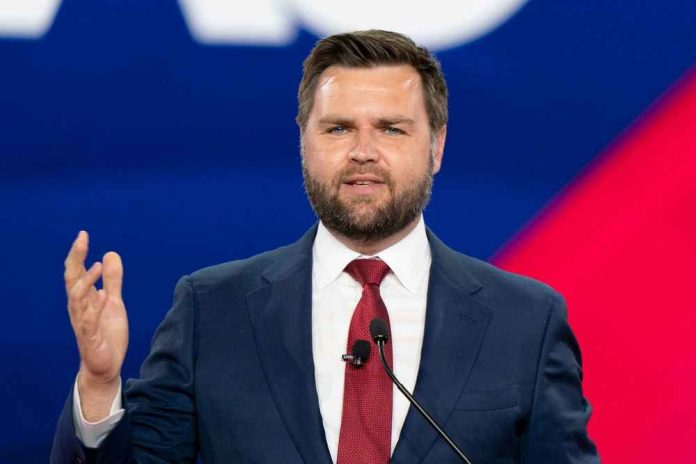
Vice President JD Vance’s remarks expose the futility of Russia’s prolonged aggression in Ukraine, sparking renewed calls for peace.
Story Snapshot
- JD Vance criticizes Russia’s stalled military efforts in Ukraine.
- Minimal territorial gains despite heavy casualties.
- U.S. urges Russia to engage in peace talks.
- Economic costs and international isolation mount for Russia.
Vance’s Critique of Russian Military Strategy
In a recent televised interview, U.S. Vice President JD Vance openly criticized Russia’s ongoing military campaign in Ukraine. Vance highlighted the lack of significant territorial gains by Russia despite the considerable human and economic costs incurred. His remarks underscore the ineffectiveness of Russia’s strategy and emphasize the need for Russian leadership to reconsider their approach and engage in meaningful peace talks. This direct critique from a high-ranking U.S. official signals a shift in messaging, focusing on the stalled nature of the conflict and the importance of diplomatic resolution.
The conflict, which began with Russia’s full-scale invasion in February 2022, has reached a stalemate by 2025. Despite initial advances, Russian forces have made only incremental territorial gains. The war has transformed into a costly war of attrition, with both sides suffering heavy casualties. Diplomatic efforts have repeatedly stalled, largely due to Russia’s reluctance to engage in substantive negotiations. This static front and high cost have drawn criticism not only from U.S. officials but also from international observers who see the toll on civilians and the global economy.
Impact on Civilians and Global Economy
The ongoing conflict has devastated Ukrainian infrastructure and displaced millions, creating a humanitarian crisis. The repercussions extend beyond Ukraine’s borders, with global food and energy markets significantly impacted. Russia faces mounting economic sanctions and international isolation, further straining its economy. Meanwhile, Western military and economic support continue to bolster Ukraine’s defense, highlighting the geopolitical complexities involved. The stalemate raises concerns about the long-term implications of a protracted conflict, including further destabilization and economic challenges for Europe and beyond.
As the conflict drags on, the pressure on Russia’s economy intensifies. Sanctions and war expenditures have strained its resources, while Ukraine faces massive reconstruction needs. The political landscape within Europe and the U.S. reflects divisions over continued support for Ukraine, with debates surrounding the effectiveness of Western intervention. Nonetheless, the defense and energy sectors are heavily impacted, and humanitarian organizations face ongoing challenges in delivering aid to affected regions.
Calls for Renewed Diplomacy
In light of these developments, Vice President Vance’s call for renewed diplomacy reflects a strategic pivot by the U.S. administration. Encouraging greater European involvement in supporting Ukraine, Vance’s remarks serve as a reminder of the need for a negotiated settlement. While Russia continues to refuse bilateral or trilateral talks, the emphasis on diplomatic engagement underscores the importance of finding a resolution to prevent further human and economic costs. The situation remains fluid, with ongoing discussions about potential paths to peace and the role of international actors in facilitating dialogue.
Experts widely agree on the stalled nature of Russian advances and the war’s transformation into a costly stalemate. Political scientists highlight the risks of escalation and the challenges of negotiating peace. The debate continues over the effectiveness of Western support and the prospects for a diplomatic resolution. Vance’s remarks align with independent assessments, emphasizing the need for Russia to wake up to the realities of its stalled campaign and pursue a peaceful solution.
Sources:
JD Vance mocks Russians over ‘stalled’ war in Ukraine …
Russia fires over 600 drones, missiles in deadly overnight …


